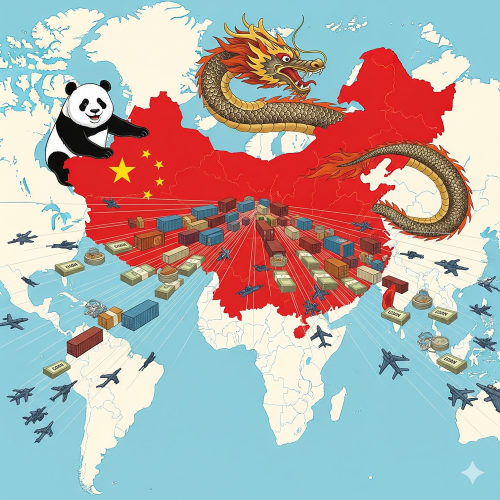How are Chinese trade agreements with Brazil, Argentina, and Chile challenging U.S. economic dominance in the region?

China's trade agreements with Brazil, Argentina, and Chile challenge U.S. economic dominance by reorienting the region's trade flows, securing a stable supply of vital raw materials for China, and offering an alternative development model that bypasses Western conditionalities.
This strategic engagement positions China as a top trading partner, effectively diminishing the historical economic leverage of the United States.
Shifting Trade Partners and Reorienting Economies
For decades, the United States was the primary trading partner for most of South America. However, China's economic rise and immense demand for raw materials have fundamentally altered this dynamic. Through a combination of trade agreements, direct investment, and lending, China has supplanted the U.S. as the top trading partner for Brazil, Argentina, and Chile.
-
Brazil: China has become Brazil's largest trading partner, surpassing the U.S. by a significant margin. Brazil primarily exports soybeans, iron ore, and crude oil to China. This trade relationship is a cornerstone of the Brazilian economy, providing a massive market for its agricultural and mineral exports. The sheer volume of trade creates a strong economic interdependence that makes Brazil less reliant on the U.S. market.
-
Argentina: China is a major buyer of Argentine agricultural products, especially soybeans and meat. Additionally, China has extended a direct credit line to Argentina's central bank, providing financial stability and influence. This economic lifeline gives Argentina an alternative to a traditional, U.S.-led financial system and institutions like the International Monetary Fund (IMF).
-
Chile: China has a free trade agreement with Chile that has been instrumental in making China its largest export market. Chile's copper, a critical mineral for China's manufacturing sector, is a key component of this trade relationship. Chinese firms have also invested heavily in Chile's energy and infrastructure sectors, including acquiring stakes in electricity distribution companies, further solidifying their economic presence.
This reorientation of trade from the North Atlantic to the Pacific Ocean directly undermines the economic influence the U.S. has long held in the region.
A Focus on Raw Materials and Supply Chain Control 🇨🇳
China's trade strategy with these nations is not simply about buying goods; it's about securing a stable and diversified supply chain for its own industrial needs. For Brazil, Argentina, and Chile, this often means a "re-primarization" of their economies, where they become more focused on exporting raw commodities rather than developing diversified, value-added manufacturing sectors.
This model serves China's interests by ensuring a reliable flow of raw materials at competitive prices. The U.S., which imports a more diverse range of products from the region, is now competing for a market that is increasingly geared toward meeting China's specific demands for:
-
Minerals: Copper from Chile and lithium from Argentina are essential for China's technology and renewable energy industries.
-
Agricultural Goods: Soybeans from Brazil and Argentina are crucial for China's food security and a growing demand for a protein-rich diet.
-
Energy: Oil and other energy resources from Brazil fuel China's vast industrial base.
This strategic control over key supply chains gives China an advantage in a global economic competition where resource security is paramount. It also raises concerns for the U.S. and Europe about their access to these vital resources in the future.
The Geopolitical Challenge and Alternative Model
Beyond trade, China's economic engagement challenges U.S. influence by offering a compelling alternative to the Western model of development. The U.S. has traditionally used trade and aid as tools to promote its values, often tying deals to democratic reforms, human rights, and fiscal transparency.
-
"No Strings Attached": China's approach, often summarized as "no strings attached," is highly attractive to many Latin American leaders. This allows them to secure much-needed financing for large-scale infrastructure projects without facing scrutiny over governance or domestic policy.
-
Infrastructure Investment: The U.S. has been criticized for neglecting infrastructure development in the region. In contrast, China's Belt and Road Initiative (BRI) has invested billions in ports, railways, and power grids, which directly facilitates trade and solidifies China's economic footprint. The Chancay megaport in Peru, a Chinese-led project, is a prime example of an infrastructure project that will reroute trade from South America to Asia, bypassing the U.S. and the Panama Canal.
This competition for influence forces the U.S. to re-evaluate its long-standing relationships in the region. The U.S. has responded with its own initiatives, such as the Partnership for Global Infrastructure and Investment (PGII), but these efforts have often been criticized for their lack of scale and speed compared to China's.
In conclusion, China's trade agreements and economic activities are not just about commerce; they are a strategic instrument to challenge and ultimately displace U.S. economic dominance in a region that has historically been within its sphere of influence. By providing a stable market for commodities and an alternative to Western-led development, China is fundamentally reshaping the economic and geopolitical landscape of South America.
- Questions and Answers
- Opinion
- Motivational and Inspiring Story
- Technology
- Live and Let live
- Focus
- Geopolitics
- Military-Arms/Equipment
- Sicurezza
- Economy
- Beasts of Nations
- Machine Tools-The “Mother Industry”
- Art
- Causes
- Crafts
- Dance
- Drinks
- Film/Movie
- Fitness
- Food
- Giochi
- Gardening
- Health
- Home
- Literature
- Music
- Networking
- Altre informazioni
- Party
- Religion
- Shopping
- Sports
- Theater
- Health and Wellness
- News
- Culture

